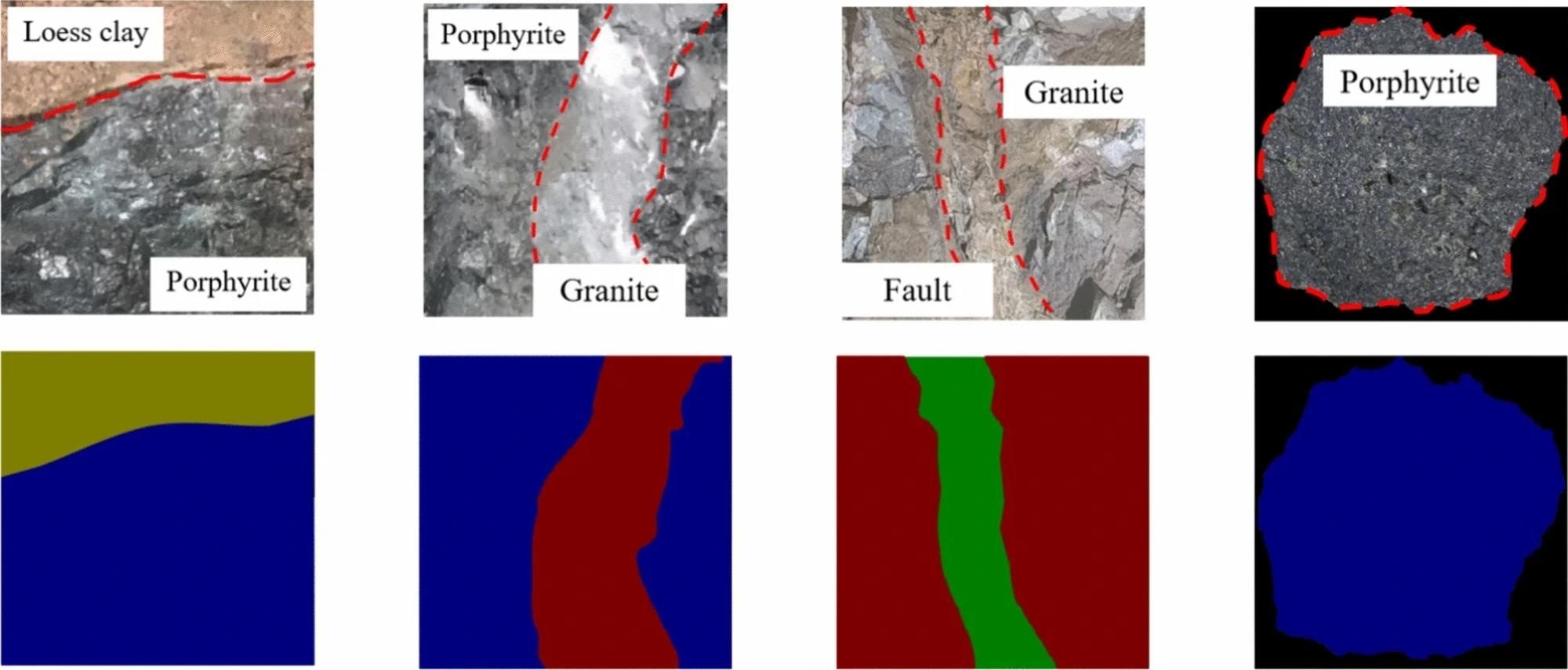In a paper published in the journal Scientific Reports, researchers introduced a novel artificial intelligence (AI)--based approach to enhance rock strength assessment and lithology identification in geological engineering. The method effectively identifies lithology and determines rock weathering degrees using a transformer + UNet hybrid model and an optimized residual network version 18 (ResNet-18) model. The approach demonstrated low error rates in tunnel face strength detection, proving its effectiveness in improving construction safety and efficiency. This multi-model system offers significant advancements in real-time geological assessments.
 Lithology annotation method in rock images. Image Credit: https://www.nature.com/articles/s41598-024-68704-0
Lithology annotation method in rock images. Image Credit: https://www.nature.com/articles/s41598-024-68704-0
Background
Past work in tunnel construction has primarily relied on traditional methods like uniaxial compressive strength (UCS) and velocity tests for rock strength assessment. Recent advancements have introduced AI-based methods, such as transformer + U-Net for lithology identification and ResNet-18 for weathering degree assessment, significantly enhancing precision and efficiency. These models provide timely and accurate rock strength evaluations by processing real-time site data, improving construction safety and decision-making.
Rock Strength Assessment
The methodology for determining rock strength in tunnel construction involves analyzing the effects of weathering on UCS. Weathering, categorized into physical, chemical, and biological processes, significantly reduces the UCS of rocks by altering their internal structure and composition. To accurately assess rock strength, a correction coefficient based on the degree of weathering is applied, adjusting the original UCS value to reflect the actual conditions of the rock, thereby guiding safer and more reliable tunnel construction practices.
The study leverages advanced image processing neural networks, specifically a hybrid transformer + UNet model, to address the challenges of lithology segmentation in complex tunnel face images. The transformer component captures global contextual information, while the UNet component restores spatial details, producing highly accurate segmentation masks.
The ResNet-18 model is employed to determine the weathering degree, utilizing its hierarchical feature extraction capabilities to classify rock images into weathering categories. This approach effectively captures detailed textures and abstract patterns on rock surfaces, allowing for precise weathering degree classification. Combined, these models provide a robust and efficient framework for real-time analysis of tunnel face conditions, enhancing rock strength assessment and contributing to safer tunnel construction.
Innovative Rock Assessment
This study presents an innovative approach to assessing rock strength during tunnel construction, integrating advanced neural network models to analyze tunnel face images. The methodology focuses on addressing the effects of weathering on UCS by applying correction coefficients based on the degree of weathering. The transformer + UNet model is employed for lithology segmentation, leveraging its ability to capture global contextual information and restore spatial details.
This hybrid model is optimized using focal loss to manage class imbalance, enhancing segmentation accuracy. The ResNet-18 model is utilized to determine the weathering degree of rocks, effectively capturing detailed textures and patterns, leading to precise classification. The performance of these models was rigorously evaluated through training and validation, demonstrating their effectiveness in accurately predicting geological features in tunnel construction. The transformer + UNet model achieved a dice similarity coefficient of 95.43%, a mean Intersection over Union (mIoU) of 91.29%, and a mean pixel accuracy (MPa) of 95.57%.
Additionally, the ResNet-18-opt model showed superior accuracy in determining rock weathering degrees, with a training accuracy of 96.13% and test accuracy of 95.95%. The consistent decrease in training and validation loss across 500 epochs indicated the models' robust generalization capabilities and resistance to overfitting. In a practical application, this methodology was applied to a highway tunnel project in Georgia, focusing on the rock types porphyrite and granite.
Integrating the transformer + UNet and ResNet-18-opt models allowed for real-time analysis of tunnel face images, leading to the accurate identification of lithology and weathering degrees. The corrected rock strength values calculated using this method showed a minimal error margin of 9.33% compared to laboratory test results, validating the method's reliability and precision in real-world conditions.
The study also highlights the potential economic benefits of this AI-based approach, which reduces the time and costs associated with traditional rock strength assessment techniques. In conclusion, the proposed neural network-based rock strength assessment method significantly enhances the accuracy and efficiency of tunnel construction projects. The method's adaptability to diverse geological conditions and its potential for generalization to other engineering projects underscore its value as a powerful tool for improving safety, efficiency, and economic outcomes in geological engineering.
Conclusion
To sum up, this study proposed a novel approach to rock strength assessment using artificial intelligence. It employed a transformer + UNet hybrid model for precise lithology identification and an optimized ResNet-18 for accurate rock weathering degree determination.
Experimental results demonstrated that the Transformer + UNet model achieved 95.57% accuracy in lithology tasks, while the ResNet-18 model reached 96.13% accuracy in weathering degree assessment. The method showed an average relative error of only 9.33% in tunnel face strength detection. The multi-model neural network system improved prediction accuracy and efficiency, enhancing construction safety and economic outcomes.